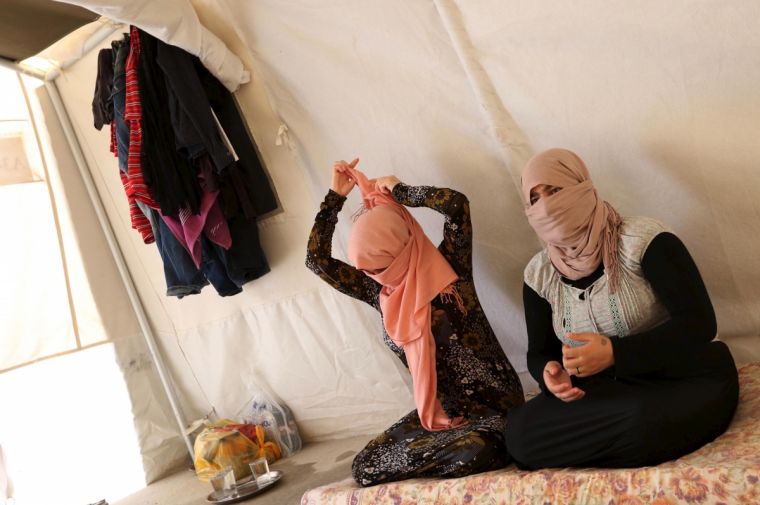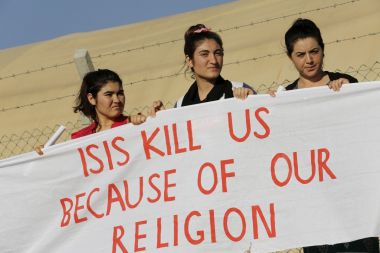Babies Beaten, Girls Raped And Tortured: The Yazidis Suffering Under ISIS

After escaping rape, torture and enslavement at the hands of Islamic State, Yazidi women and girls are being failed by the international community, Amnesty International said on Monday.
A damning report from the charity said that survivors needed greater support to cope with the long-term implications of their trauma.
UN researchers have confirmed that when ISIS militants took over the Sinjar region in northern Iraq in August 2014, up to 5,000 Yazidi men were killed in a series of massacres that forced more than 400,000 people to flee.
Thousands of women were taken captive and disturbing accounts of have emerged from those who have since managed to escape. Women and children have been brutally raped and abused; bartered and sold among jihadists for pennies.
Amnesty researchers spoke to 18 women and girls abducted by ISIS and now living in the Kurdish region of Iraq.
One 20-year-old woman from Sinjar city, Jamila (names have been changed) described being raped repeatedly by at least 10 different men after being sold between militants. She was eventually released in December last year after her family paid a huge ransom.
Jamila said she and other women and girls were taken to Mosul, where they were forced to remove their clothes and "pose" for photographs. As punishment for trying to escape, she was tied to a bed, gang-raped, beaten with cables and deprived of food.
Another 16-year-old captive, Nour, was held by militants for almost two years, during which time she gave birth to a baby daughter. Her aunt and three sisters are still being held.
"To them [ISIS militants] we are 'kuffar' [infidels] and they can do whatever they want," she said. "It was so humiliating. We were imprisoned; they wouldn't feed us; they would beat us [all] even the small children; they would buy and sell us and do whatever they want to us... It is like we are not human to them.

"I am free now, but others are still living in this nightmare," she added, "and we do not have enough money to support ourselves and get our relatives back".
One mother, Shirin, was abducted along with her five children. Her 13-year-old daughter committed suicide after escaping by setting herself on fire.
One of her other children, 17-year-old Seveh, was raped and assaulted repeatedly while in captivity, and militants also beat her three-month-old baby. She tried to commit suicide three times, and still suffers from severe physical and psychological issues.
Amnesty said that many survivors have been left struggling to pay off huge debts of up to tens of thousands of US dollars after their families borrowed money to pay for their release. An earlier report by the charity found that they often face stigmatisation, and struggle to find husbands, reportedly leading some doctors to perform operations to 'reverse' the loss of virginity.
The majority live in "dire conditions, either with impoverished relatives who have been displaced from their homes, or in camps for internally displaced persons in the Kurdistan Region of Iraq. Their needs outstrip the support available," Amnesty said.
It is calling for a better system to assess the needs of survivors, and to ensure they receive vital care and support.
"The unimaginable horrors faced by these Yezidi [Yazidi] women and girls in IS captivity shed new light on the ongoing war crimes and crimes against humanity perpetrated by the group. Many women and girls were repeatedly raped, beaten or otherwise tortured and continue to suffer from the trauma of their harrowing experiences," said Lynn Maalouf, deputy director for research in Beirut.
"These distressing testimonies highlight the urgent need for greater international support to help survivors cope with the long-lasting physical and psychological trauma of the abuse they have endured and witnessed."
Maalouf continued: "More can and must be done to help heal the deep physical and psychological scars that women and children endure after long periods in captivity, and to offer them a hope to rebuild their shattered lives.
"The international community must translate its shock and horror at IS crimes and sympathy for Yezidi survivors of horrific sexual violence and other brutality into concrete actions. Donors must do more by setting up and funding specialized support and treatment programmes in consultation with survivors, community activists and care providers."











